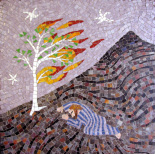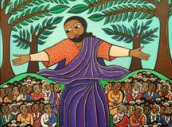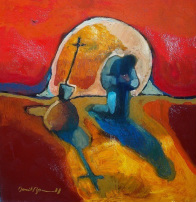
Earth’s crammed with heaven, and every common bush afire with God; but only he who sees, takes off his shoes…
- Elizabeth Barrett Browning
READING:
Moses was taking care of the flock for his father-in-law Jethro, Midian’s priest. He led his flock out to the edge of the desert, and he came to God’s mountain called Horeb. The Lord’s messenger appeared to him in a flame of fire in the middle of a bush. Moses saw that the bush was in flames, but it didn’t burn up. Then Moses said to himself, Let me check out this amazing sight and find out why the bush isn’t burning up. When the Lord saw that he was coming to look, God called to him out of the bush, “Moses, Moses!” Moses said, “I’m here.” Then the Lord said, “Don’t come any closer! Take off your sandals, because you are standing on holy ground.”
- Exodus 3.1-5
REFLECTION:
I’m sure you have heard the old saw about kids in the Deep South going barefoot in the summer; or as any son of the South worth his salt would say, “barefooted.” Well, I am a card carrying southern boy born and bred (though I don’t pull the card out very often), and I’m here to put an end to this misconception. I would say the notion is a myth, but I have too much respect for mythology to defame it in this way as simply something that is false.
There is some truth to the falsehood claim; but while close, it misses the mark by a country mile… and then some. Indigenous religions get it; take, for example the introduction a clan elder once gave to his storytelling. “I’m going to tell you a story,” he began. “It’s a lie, but not everything about it is false.” Sometimes, even philosophers get it, like the philosopher who referred to myth as “a lie designed to tell the truth.”
Myth and symbol - the language of wonder and awe in the ancients’ stories, the language of poetry - ain’t simple, as these statements indicate; but is sho’ ain’t false. It sho’ aint a statement of fact gone awry.
Take the story of the burning bush. If it were merely factual, one could ostensibly verify its actuality, measure the temperature of the flames, and eventually explain how a bush could burn without being tormented in the flames (as the rich man in another story would say). Such an experience might be many things – a hallucination, an exception to the laws of nature, even an exceptional act of power – but it wouldn’t be God. It wouldn’t be capable of inspiring Moses with the very real sense of God’s presence. It wouldn’t inspire awe, fear, and just about every emotion in between.
It wouldn’t be God, because the closest we mortals come to recognizing God’s presence is through symbols, metaphors, myths; language that starts out in the world as we know it; but which opens out to that which lies beyond; beyond the reach of factuality, limitation, or cause-and-effect. It’s no wonder one Christian thinker would refer to symbolic language as the house of God.
Moses was right to take off his shoes, because the ground he stood on was holy. He was right to take off his shoes, not as a gesture of respect, but as acknowledgement that he was in a mysterious place between earth and heaven – call it epiphany, call it a thin place, call it vision, call it living on the border of the sacred – Moses was in the presence of God.
Moses was in the presence of God, and needed to learn to walk barefoot. Walking barefoot symbolizes need, to be sure, that something important is lacking; but Moses, walking barefoot, was ready to accept help when it was offered (like the disciples accepting foot washing from Jesus). Walking barefoot symbolizes that Moses was vulnerable, as anyone knows who has stepped barefoot on a sharp rock, but it can lead to the recognition that one needs the God revealed in mystery and flame to be healed. And walking barefoot symbolizes an intimate connectedness that Moses surely felt. Walk barefoot in the park and you will feel a closer connection to the earth and to all of nature. Walk barefoot in the spirit, and you will feel an intimate connectedness to God.
Moses was right to take off his shoes, because walking barefoot offers so many analogies (again with the symbols!) to a life spiritually engaged. On Sunday we will explore what it might mean for us to learn to walk barefoot. I hope to see you then and, by the way, it’s okay to come “barefooted.”




 RSS Feed
RSS Feed



